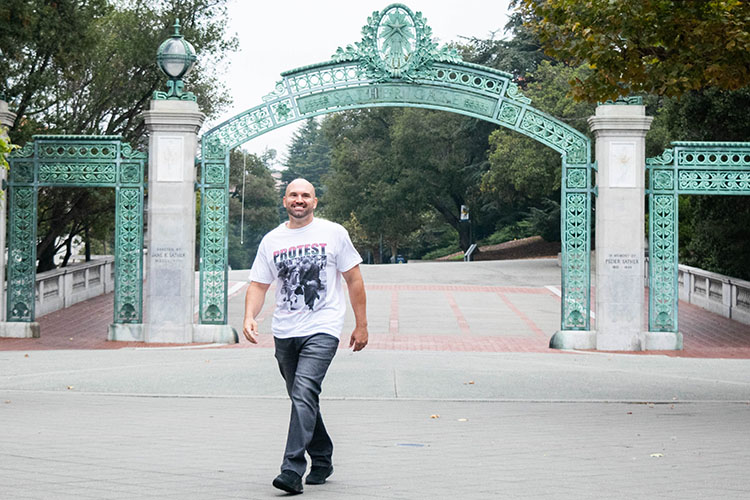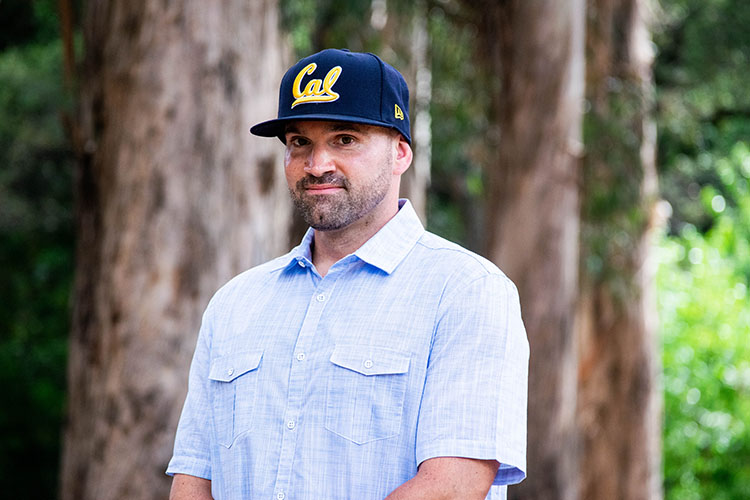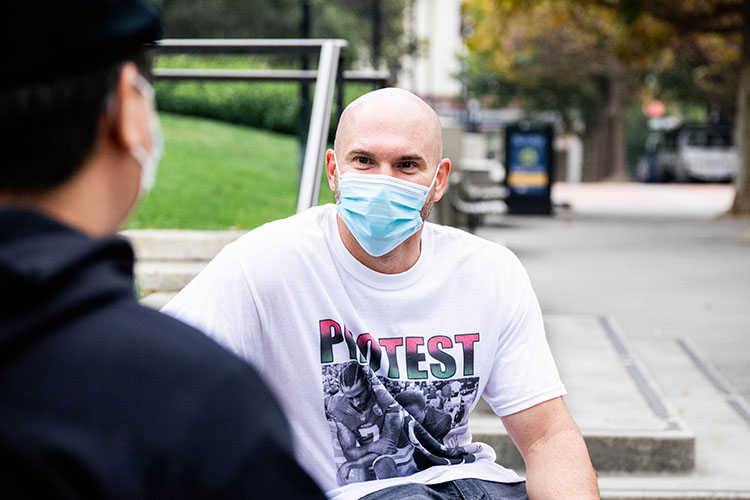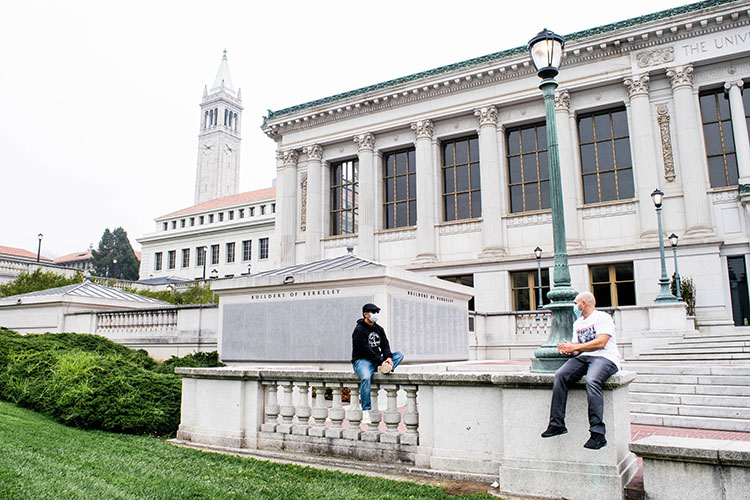From solitary hell to ‘sacred ground,’ Kevin McCarthy defies the odds
While incarcerated, he studied law and fought for prisoners' rights, even if it jeopardized his own

September 9, 2020

Kevin McCarthy, who spent nine years and four months in solitary confinement, is a new member of the Berkeley student body this fall. “In order to see this day,” he said, “I had to force myself to remain positive during some very frustrating and discouraging times.” (UC Berkeley photo by Irene Yi)
A photo of himself under iconic Sather Gate. That was Kevin McCarthy’s frequent daydream, after being admitted to UC Berkeley. But he had a recurring nightmare, too, that he’d never get to enroll. He feared it was an omen; in his sleep, a voice once whispered, “You will not be at Berkeley for a very long time.”
This fall, McCarthy, 39, finally has his photo, and his freedom, having been incarcerated 22 years — including nine years and four months straight in solitary confinement. Released July 24 from Pleasant Valley State Prison in Fresno County, he couldn’t wait to step foot on the Berkeley campus, “sacred ground,” he calls it, having been in a living hell.
“I just had to get here, to overcome the naysayers, the senseless policies that held me back, the prison guards who retaliated against me, and the nightmares,” said McCarthy. “I feel a sense of absolute joy to be here.”
He doesn’t mind that fall instruction is remote, during the coronavirus pandemic: In a studio apartment one block from Berkeley, he’s busy with online classes, a work-study job and plans for a legal studies degree, then law school.
McCarthy applied to Berkeley in 2016, was admitted in 2017, but had to defer three times. In 2016, Californians passed Proposition 57, designed to give people like McCarthy — classified as having serious, but nonviolent, convictions — a chance at early parole. Yet, McCarthy repeatedly was kept behind bars, despite serving more than the base term for his crime, earning two associate degrees and recruiting a college instructor and 30 students to launch in-person courses at Pleasant Valley.
He’s got a few theories about why. Among them, he said, were his efforts in prison to overhaul the use of indefinite solitary confinement by the California Department of Corrections and Rehabilitation (CDCR) by participating in massive hunger strikes in 2011 and 2013 and in the related class action lawsuit, Ashker v. Brown, which won a landmark settlement in 2015. He also filed a writ of habeas corpus in 2018 and will attend an evidentiary hearing later this month to try and stop “gladiator fights” — staged brawls that, for years, incarcerated individuals have accused guards of orchestrating to pit rival prison gang members against each other.
McCarthy’s law studies in prison also led him to become a jailhouse lawyer who informally helped other people behind bars with legal matters related to their sentences.

Students on campus who have been incarcerated “are indeed some of Berkeley’s best and brightest. They are Regents and Chancellor’s Scholars, University Medal nominees, they are leading incredible original research, excelling in master’s, law and Ph.D. programs, driving critical advocacy efforts and shaping (Berkeley) in ways that students will benefit from for years to come,” said Azadeh Zohrabi, director of the campus’s model Underground Scholars program. (UC Berkeley photo by Irene Yi)
“If he’d been released when he was admitted, he would likely be a law student by now,” said Azadeh Zohrabi, director of the Berkeley Underground Scholars program, which is building a prison-to-school pipeline through recruitment, retention and advocacy. “It really didn’t benefit anyone, or make anyone safer, for him to be in prison, instead of at Berkeley.”
In fact, McCarthy was unsafe. Surviving nearly a decade at Pelican Bay State Prison, near the Oregon border, in solitary confinement — a practice condemned as torture in numerous research studies and by the United Nations, which draws the line at 15 days of isolation — is extraordinary. In a tiny, windowless cell, he could talk with others only through wall vents reached by climbing atop a concrete block that he also used as a desk.
McCarthy credits Zohrabi, the Underground Scholars Initiative student organization and Berkeley’s Legal Studies Department and Office of Undergraduate Admissions with keeping his spirits up.
“I recall a period when I just felt emotionally and mentally drained,” he said, “and I received a beautiful card, signed by the admissions department, saying, ‘believe, because we believe in you.’ It put me into tears. It reaffirmed to me that … UC Berkeley had my back.”
Henry Tsai, a Berkeley admissions officer, said that, after reading McCarthy’s application, “I thought, ‘His story is amazing.’ He was an exception, unlike anyone else whose application I’d read. He had a sense of curiosity and in-depth thoughts and questions and had the true joy of knowing and understanding.”
“I couldn’t understand how someone could go through what he’s gone through,” said Tsai, “and come out as he is, the inspirational person he is.”

Kevin McCarthy holds a printout of correspondence from Henry Tsai, a Berkeley admissions officer who, after McCarthy was accepted to Berkeley, corresponded with him to help him get his paperwork together, but also wound up becoming his friend. (UC Berkeley photo by Irene Yi)
A youth tempted into gang life
‘Always rough and physical” is how McCarthy, born in 1980, described himself as a youth in El Toro, an Orange County city renamed Lake Forest in 1991. His home life was turbulent; he became violent. “It became a learned behavior,” he said, “a way to get others to do something or refrain from something. I did not learn healthy problem-solving skills. I did not learn to use words as a means of expressing myself.”
At 12, he was drawn to gang life. “I was part of a crew; we acted like gang members,” said McCarthy, “but we were just young juvenile delinquents.” At 13, his parents divorced. Unable to process his feelings, he began numbing them — first, with alcohol, then, at 15, the same age he joined a full-fledged street gang and ran away from home, with heroin.
McCarthy said his view of gangs, as a teen, was “romantic.” He admired the way they rejected authority and societal norms. And the gang members he associated with admired McCarthy’s physicality and aggressiveness. “They won me accolades,” he said. “I mistakenly believed they gave me value.”
When he was 16, McCarthy was incarcerated for the first time, at Orange County Juvenile Hall, and then sent to a juvenile camp. A year later, after escaping camp and fighting with rival gang members, he was placed in the CDRC’s California Youth Authority (CYA), today the California Division of Juvenile Justice.
“I spent the majority of my time in solitary confinement,” said McCarthy, calling the punishment “an aggressive assault on the psyche and body.” He was released in November 2000, traumatized, he said, by the violence he was subjected to and the extensive amount of time he was kept in isolation.

“I feel that protest of injustice is so important. Otherwise, important issues do not get addressed,” said Kevin McCarthy, who took on injustice while in prison by fighting as a jailhouse lawyer for the rights of incarcerated people. “We cannot count on the dominant group, or the oppressor, to do the right thing and change on their own.” (UC Berkeley photo by Irene Yi)
Among the CYA sites where McCarthy was sent was the now-shuttered Preston Youth Correctional Facility, which made headlines for sexual abuse, violent assaults, suicides and suicide attempts, use of force by staff and 23-hour isolation cells. McCarthy also recalled being so bored there — he only was allowed one book to read each week — that he’d pretend to be a guest on Ricki Lake’s talk show.
Paroled in 2000, McCarthy returned to drugs and gang involvement and, in 2001, was incarcerated again, this time for assault with a deadly weapon. He was released from Wasco State Prison, in Kern County, in 2002, only to be charged with attempted voluntary manslaughter the next year, at age 22.
“I was deeply immersed in the drug and gang scene,” said McCarthy. “I got into a dispute with a drug dealer and his friends. He became aggressive with me.” McCarthy pulled a gun to defend himself, and when the man tried to grab it, McCarthy shot and wounded him. He went to prison again, this time for 17 years.
In isolation, a love of learning grows
“I deeply regret shooting another human being, I take responsibility for it,” said McCarthy. “I have done my best to make indirect amends, and I look forward to continuing to make amends by being a force for good in this world.”
He began that work at Pelican Bay, where he was in solitary confinement from 2006 to 2015, while also learning to navigate life in isolation. He was placed there by a now-defunct CDCR policy that sent imprisoned people to “the SHU” — a solitary housing unit — if they had been validated by the department as affiliated with a prison gang. Zohrabi said that could occur even if an incarcerated person was found with a book belonging to a prison gang member or affiliate.
“It was all very arbitrary,” she said. “Now, you can only get solitary as a disciplinary measure for violating prison rules, and the most you can get is five years, and that would be for killing a correctional officer.”

Henry Tsai (left), a Berkeley admissions officer, said Kevin McCarthy (right), whose application he read four years ago and who became a pen pal of McCarthy’s during the last stretch of his incarceration, has a “capacity for kindness and grace, even after all the things he’s been through.” (UC Berkeley photo by Irene Yi)
Zohrabi met McCarthy while on the legal team for the Ashker v. Brown lawsuit against Pelican Bay for its use of long-term solitary confinement. She interviewed incarcerated plaintiffs, including McCarthy, about their experiences and monitored their health during the hunger strikes — the two-month fast in 2013 involved 30,000 people imprisoned in more than a dozen state facilities.
“I was impressed with his sharp legal mind and inquisitive nature,” she said.
McCarthy said he entered solitary unwilling to let anything break his mental control. He kept busy, recognizing, he said, that “I shouldn’t get too caught up in my head.” Every day, in his mind, he’d transform his cell into various places — a gym one day, a law office the next, a self-help meeting place, a classroom and, every Wednesday, a monastery.
“I’d fast ‘til dinner and listen to preachers on TBN (Trinity Broadcasting Network), a station Pelican Bay had,” he explained. “Fasting seemed spiritual. I’d drink coffee or tea and read the Bible while I listened.”
He also discovered a love of learning — he was allowed 10 books at a time — and sharing that knowledge with those in the seven cells connected to his. “Shortly after I arrived, I helped someone with the math portion of the GED,” he said. “I also started teaching Spanish and wrote out quizzes for my podmates.”
Later, when McCarthy was up for review for release from solitary, he asked a man in an adjoining cell who’d studied law to teach him what he knew. “And it went from there,” he said, of studying law. “I wrote my petition, he edited it, and then I started doing it for others. I found that it gave them hope. I wasn’t always successful, but I helped get some of their sentences reduced and won someone an administrative appeal.”
McCarthy wound up earning AA degrees in American studies and sociology and set a goal to attend UC Berkeley and law school. In January 2015, he told a CDCR development review board of his plan, but said that the chair “chuckled at my response and asked if I believed those were realistic goals. I don’t think many people took me seriously.”

A UC Berkeley greeting card that Kevin McCarthy treasures and would read when he got discouraged in prison — his enrollment had to be deferred three times — was sent to him by the Office of Admissions; each staff member wrote a personal message to him. (UC Berkeley photo by Irene Yi)
The ‘grand finale’ and a new beginning
Ilene Abrams did. The retired Berkeley High School college adviser agreed to help guide McCarthy through the UC application process and be his advocate. At the time, he’d been let out of solitary confinement and was at Pleasant Valley.
“Kevin has resiliency, … and what amazed me is that he took every setback to getting out of prison, thought about it, relied on his faith and said, ‘I’ve been through so much, I can do this, too,’” she said. “But while he was determined to get out, he kept standing up for injustice, even if doing so might have negative repercussions for him. He gives me hope in humanity.”
McCarthy was accepted to several other UCs and to California State University campuses before he learned of his admission to Berkeley. “It was like the grand finale,” he said. “I cried, I was just so overwhelmed with joy. That moment was the highlight of my life.”
But he wound up having to wait several years to enroll. It was a test of character, said Tsai, who began corresponding with McCarthy, after McCarthy was admitted to Berkeley, through his work supporting the Underground Scholars program. McCarthy had questions for Tsai about Berkeley, but the two men also became pen pals and friends.
“Our letters were chatty. He’d ask me about my son, and I’d ask what books Kevin was reading,” said Tsai. “We talked about everything from social justice to what Berkeley stands for to how my son loves Star Wars.”
McCarthy’s letters, sometimes handwritten, at other times produced on an old-fashioned typewriter, “didn’t give a sense of doom,” he added. “I remember him expressing to me some tough times, some dark times. But his sense of optimism and hope always came through.”

“While I was in prison, I frequently imagined taking a picture in front of Sather Gate,” said Kevin McCarthy. “That image would make me smile during difficult times; it represented the light at the end of the tunnel for me.” (UC Berkeley photo by Irene Yi)
Since McCarthy was to be on parole in Orange County, where the crime happened, Abrams and Tsai assembled the paperwork to transfer his parole to Alameda County. He was expected to start school next spring, but arrived for fall semester instead, since the CDCR released him early as part of efforts during the pandemic to reduce the prison population.
Tsai finally met McCarthy in person on July 24, a month before classes began. McCarthy and his father and sister drove to Oakland to meet McCarthy’s parole officer, and afterward, at a nearby outdoor spot along the bay, they visited with Tsai, Tsai’s son, Abrams and McCarthy’s lawyer, Rebecca Rabkin.
“We had lunch and then stayed and chatted. I felt like I’d finally met him, but had been talking to him for four years. We just picked up where we’d left off, like, ‘Hey, did you read that book? Did you like it?’” said Tsai. “I told him to chill out, not do too much, see what first semester holds. But he wanted to jump in with both feet.”
That’s what formerly incarcerated students at Berkeley do, said Zohrabi, adding that there are about 120 students in the Underground Scholars program, and around half of them have been imprisoned. Their pursuit of higher education “changes their lives and the lives of their families,” she said. “Many of them, after they graduate, are going to work in public service, at legislative offices and nonprofits. Some go into law or education, and a lot go into social work.”
“A big theme and commitment among our students,” said Zohrabi, “is trying to shape the systems that had a big impact on their lives to more life-affirming systems.”
As for McCarthy, he plans to become an attorney with a specialty in public interest litigation.
“It is my dream to attend Berkeley Law and learn from the best,” he said, “so that I can go back out there and continue to fight for prisoners and for other mistreated and underrepresented groups.”